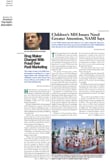The escalating cost of prescription drugs has prompted a new look at an old strategy—bulk purchasing.
Families USA, a health advocacy organization, released information at a press conference on June 2 that showed that the Department of Veterans Affairs (VA) has negotiated savings on the cost of prescription drugs that exceed those available to Medicare beneficiaries who use prescription-drug discount cards.
Through the Medicare program, beneficiaries have since June 1 been able to select from among discount cards sponsored by private companies and endorsed by Medicare. Card sponsors can charge an enrollment fee, and they offer savings at various levels for medications of their choosing.
The new Medicare law specifically prohibits the federal government from negotiating to achieve lower drug prices for those beneficiaries.
The Families USA data show that the lowest discount card price for the cholesterol-lowering drug Lipitor, the most frequently prescribed drug for older people, is 59 percent higher than the price negotiated by the VA. The data also show that the lowest discount card prices for half of the top-20 brand-name drugs prescribed for older people are at least 50 percent more expensive than the VA's prices.
The antidepressant Zoloft (sertraline) is the only drug used to treat mental illness on the list of the 20 drugs analyzed by Families USA. The VA price for 30 days is $43.23, and the lowest Medicare discount card price is $67.59.
At the press conference, Sen. Deborah Stabenow (D-Mich.) said, “The phenomenal power of federal bulk purchasing has been proved by the Veterans Administration, but those crafting the Medicare bill yielded to the influence of the pharmaceutical industry and blocked Medicare from using its large pool of beneficiaries to negotiate good deals.”
Bush administration officials and representatives of the pharmaceutical industry challenged the Families USA comparisons.
According to the June 2 CongressDaily, Tommy Thompson, secretary of Health and Human Services, said, “It's not an applesto-apples comparison.” Rick Smith, a spokesperson for the Pharmaceutical Research and Manufacturers of America, said, “Medicare would be a price fixer, not a negotiator,” according to the June 3 Long Island Newsday.
How the VA Cuts Costs
The General Accounting Office (GAO) issued a report, “VA and DoD Health Care: Factors Contributing to Reduced Pharmacy Costs and Continuing Challenges,” on July 22, 2002, that identified factors, including the use of drug formularies, that contribute to cost reduction.
The use of formularies depends on the idea that some drugs are“ therapeutically interchangeable—that is, essentially equivalent in terms of efficacy, safety, and outcomes.”
Use of a particular drug, therefore, can be encouraged by placing it in an“ open” class in the formulary or mandated by placing it in a“ closed” class. In either case, savings can accrue by promoting the use of less-expensive, but effective, drugs and by negotiating lower costs by ensuring bulk purchasing.
The VA also uses various purchasing arrangements to cut costs. The VA, Department of Defense (DoD), Public Health Service, and Coast Guard can purchase drugs at the Federal Ceiling Price, which is a specified percentage lower than the average manufacturer's price.
The VA has conducted competitions among manufacturers to gain the lowest price for generic drugs.
Joint procurements between the DoD and the VA also result in savings, particularly for generic drugs, because manufacturers respond to the anticipated volume of sales by cutting their prices.
Employers Explore Bulk Buying
According to an article in the June 12 New York Times, the private sector also sees value in bulk purchasing.
Fifty of the country's largest employers are creating a “buyers' club” to negotiate directly with drug manufacturers, rather than relying on pharmacy benefit management (PBM) companies to secure the best prices.
PBMs typically secure rebates from manufacturers, but have not been required to tell the companies on whose behalf they negotiate what those rebates are.
Jane Lohmeier, benefits manager for one of the 50 companies, told the Times, “We require price transparency in everything we do. But drugs have been a little bit of a black box.”
The buyers' club will negotiate for the 50 drugs that represent the greatest cost to members, including the antidepressants Zoloft, Paxil, and Effexor.
“VA and DoD Health Care: Factors Contributing to Reduced Pharmacy Costs and Continuing Challenges” can be accessed online at<www.gao.gov> by clicking on “find reports” and then following prompts to enter“ GAO-02-969T” for report number. ▪
